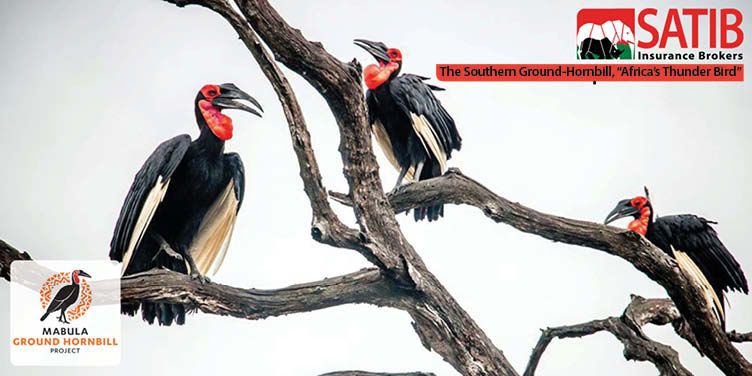
The second half of 2019 has been a successful one for the Mabula Ground Hornbill Project and Southern Ground-Hornbill conservation, however, nonetheless challenging. This winter season has been an exceptionally dry one, making food availability scarce and leading up into spring and summer, the temperatures hotter than usual. Amidst these challenges the Southern Ground-Hornbill have pulled through and the breeding season is underway. The alpha pair from Mabula’s reintroduced group have been observed copulating and the males are eagerly taking nesting material and food to the nest, where the alpha female spends most of her days. We are holding thumbs that some eggs are laid and are doing all we can to assist with this process.
With all the testosterone and love in the air one of the subordinate younger males has been ejected from the group. He is managing successfully on his own and we are monitoring the situation to determine if this is just a temporary disciplinary act or if it is in fact another dispersal from the Mabula group. Last year’s dispersing male may be a potential respite for the newly ejected bird, being his “elder brother” who now has a female and a selection of nests of his own. This could be the first natural formation of a “bush-school” by reintroduced Ground-Hornbills.
Love really does seem to be in the air, as our Loskop dispersal has also been set up with a female and a juvenile and his former group are actively tending to their new nest. As for our reintroduced group in Thabazimbi, things have not been as smooth sailing. The alpha male was observed showing behavioural signs outside of his norm, which raised concern and prompted us to go in and investigate. It was found that the whole group were showing elevated lead levels in their blood. This is a major concern for Ground-Hornbills, as even a fragment of lead the size of a grain of rice ingested can prove fatal to this species.
The decision was made to capture the birds and transport them to the Onderstepoort veterinary hospital to receive chelation therapy under the supervision of our trusty vet, Dr Katja Koeppel. After a slight hiccup in the form of two of them escaping from the hospital, the birds were successfully treated and returned to their natural habitat, where they now have a new nest and will no longer have to face the potential threat of lead contamination. May their breeding season be as successful as their recovery!
Our work continues throughout South Africa, with important education going out to hundreds of individuals residing in Ground-Hornbill habitats, spreading the word about the plight of Southern Ground-Hornbills and gathering as many sightings of these birds as possible. The new release of our educational comic “Vusa the hornbill guardian” will no doubt increase the interest in “Africa’s Thunder Bird” and raise awareness to the threats that this species faces. Not only is the comic new, but newly designed nests “Super Nests” have been constructed and are being provided to wild and captive Ground-Hornbills to offset the loss of natural nest sites. Additionally, we have partnered up with “Elephants Alive” to help protect large nesting trees from elephant damage using beehives.
All in all, a busy end to 2019, with exciting science and prospects on the cards for 2020. With each milestone we reach and each challenge we conquer, we lift the conservation status of Southern Ground-Hornbill further and further away from endangered, giving this iconic bird a fighting chance at surviving into the future.
Article credit: Jarryd Alexander